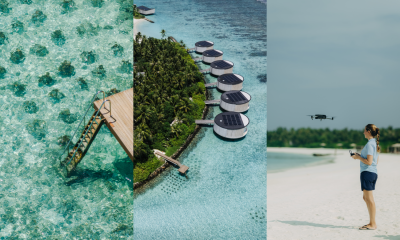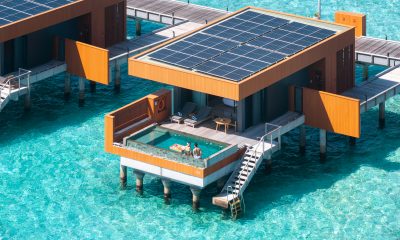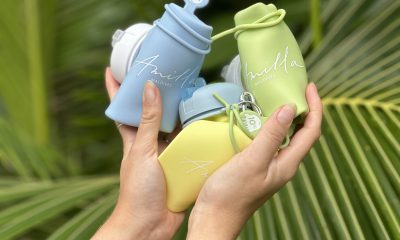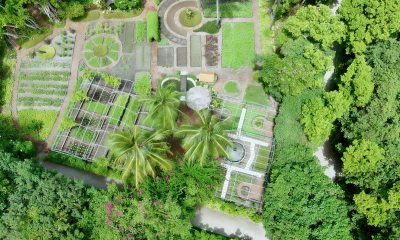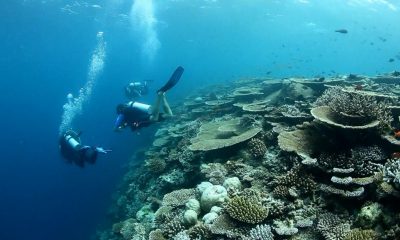Featured
Gunter Pauli: Visions of a blue economy

By Shamman Zahir
The man nicknamed as the Steve Jobs of sustainable development, Gunter Pauli designs and implements businesses by using what is locally available. Best known for his book, The Blue Economy (published first in 2009 now translated in +50 languages), looks at this concept in which what is good for you and the environment should not have to cost more unlike what a green economy suggests.
Maldives Insider team had the opportunity to discuss with Gunter what this could mean for the Maldives as a country at the forefront of countries to be affected by rapid climate change.
He believes that with new insights you can correct the errors in your ways and it is never too late to do the right thing. The man truly believes in his work and ethics, that he does not have a car to this day since 1994. We are certainly not suggesting you change your way of life overnight, but simply hear out what Gunter has to say.
Maldives Insider: Tell us briefly how you started on this path you’re on now.
Gunter Pauli: I established the first ecological factory in history, correct. We had to have a factory that has no waste, emits no emissions, that should pay its staff to come on a bike instead of using a ride share service, it was a surprise to the world at the time. I launched the concept of Zero emissions. Any business should be a zero emissions business. Not net zero in 2030 or 2040. Now! This was in 1989. So, I built the first factory practicing what I had proposed. It was a major success.
MI: What interested you to focus your efforts into this line of work?
GP: It gives you dignity. How much dignity is it to have a chicken frozen in Brazil on your plate here? It satisfies your need to eat. It’s a very basic principle. I figure out what I have and go from there. I will give you an example close to home. You have the largest seaplane fleet in the world. Where does the fuel come from? It is imported. When fuel price increases, it directly effects the airfare at the same pace. This causes a huge drain on the cash available in the country. Do people realise that the algae growing in the sea, that they have the fuel you need to power the aircrafts? Give it a chance! You have it already; the raw materials are around us. It has no dignity to have to import fuel to have to fly people around the nation.
Here is an interesting story. A whale’s heart. It’s pumping thousand litres per pulse. How much electricity does it need to pump? You would imagine a lot. The reality is though, it’s only 6 volts. If you tell an engineer, I have a pump of 6 volts that can pump 1000 litres then the initial reaction would be, impossible. Although there are million whales in the ocean that already do this. So similarly, you have mangroves here. You bite into a leaf, it’s not salty. Yet its roots stand in salt water. This is due to reverse osmosis and capillary action. A mangrove does not use pumps, instead it uses thin tubes called capillaries for its function. So, at the end of the day, be innovative, be more creative.
Blue economy challenges people to start with what you have. Not for you to get filthy rich fast. It is to stamp out poverty and to have an abundance of drinking of water available to all. The mangroves are not suffering, why do you suffer?
MI: What are your thoughts on green energy and how it will benefit the Maldives, especially the tourism sector?
GP: It’s by doing a thousand little steps. We don’t need signed pledges of carbon emissions to be cut down by a certain date. What we need is owners and management that sets these goals with a clear objective in mind. Go to the root causes and figure it out. The same quality assurance imposed on marketing and customer satisfaction applied to sustainability is what we need. Risk analysis is common in business, new technology lets wait and see how it goes is the common script. We believe in the ideas as much to invest in them ourselves. The technology is here today.
Sustainable resorts are the future. With an increasing number of conscious consumers more people would be inclined to spend their money knowing that this stay offsets their carbon footprint.
First, set your goals clearly. Second, be impatient. Don’t push what needs to be done for later. The third thing is, with one initiative aim to meet multiple goals.

MI: What are the biggest challenges you’d predict moving forward with the ideas of a blue economy? There will be critics who’d rather have the convenience now than sustainability. What is your response to that?
GP: My response is, what do you want in life? Do you want convenience or do you want to have happiness and health? It is as simple as that. It’s your choice. Many people choose convenience and that is why we have 50 percent of the world now obese. Is that what we want to have or happiness and health? I am not saying you shouldn’t eat the frozen chicken. What I am saying is it is important to think out of the box in terms of how can I feed the people on my island with what is available to us. Particularly after Covid I believe more people would rather have happiness and health.
I will tell you of a real-life example from Las Gaviotas, Colombia. In 1984, we decided on a region where 70 percent of the people have diabetes and gastro intestinal issues. We decided to find out what was causing this. We asked ourselves, what do we need to take the root cause away? You have to have a good job, with good physical exercise, food without excessive sugar and water that is rich in the right minerals. Hm, that sounds like we have to regenerate a forest.
That requires a lot of manual labor, it creates shade and better water quality. I am happy to report to you 30 years after we started, we had to close the hospital due to lack of patients. It is a the only such case in the world. That is 8000 hectors of forest land and 12,000 people living without a hospital.

MI: Given that it is one of the hottest summers on record, the timing of this interview is ironic. Of all the possible course of action, what should be top priority right now?
GP: We cannot do a change of the global system overnight. It’s about small initiatives making an impact. That is why I am so interested in the Maldives. 100’s of islands with small populations. If the Maldives can show that it can be done, it is a lesson to the world. The Maldives is a humble and modest nation. You don’t say, we know. Instead have the attitude of can I learn from you?
I was able to 15 years ago to design the first large island that is a 100 percent fossil fuel free. In Spain called El Hierro. The island was at the end of its life. The younger generation wanted to live in the bigger cities such as Barcelona, Valencia and Madrid. The elders said, what can we do to reverse this? We offer subsidies, we offer free education but they aren’t coming. I said you have to offer the next generation a challenge. To become a 100 percent fossil fuel free island. They asked how? I asked what do you have around you? They have an elevation and old craters exist. We designed a system with 5 windmills and pumping of water up and down. We have the first 100 percent reverse osmosis desalination plant and pump the water to the highest crater (700m) and when there is no wind and the water comes down, we generate hydropower. Financially it didn’t work unless we integrated both the water and power production. What used to be an expense, now accounts for 15 percent of its income by supplying water to its people. When we first started on the island there was 5600 people on the island. Today they have 12800. People came back. Why? People thought it was a great idea to live in a self-sufficient island. With these concepts it opened up jobs and new engineers required to have gravity feed systems.
My message is, take those small steps. The small initiatives make a big impact over time.
MI: Maldives currently takes a green tax from the tourism sector, what would be the best way to use such funds in your opinion?
GP: Make your islands free of fuel. It is a big drain on your cash. Being a small country, solar is expensive and takes up a lot of space. The wind reserves and structure are not as feasible to have windmills nor would it be aesthetic. What is the most innovative but practical steps you can take to turn things around? I have made suggestions of how you can produce your fuel with very little space. If that can be accomplished it helps the brand image and convinces consumers to spend consciously.
The right leaders are very important. A leader is not necessarily a boss. It is one who gives an incredible example with performance and transparency striving towards your goals.
MI: What is your message to those interested in contributing to this work?
GP: Start young! You want to be happy and healthy having the energy I have at this age, start young. Do what you believe in. Focus on what is giving you results. Sometimes, results can take a long time. Don’t always accept the easy way. Rome was not built in one day. Blue economy captures that philosophy and adds science. If you have science as the backbone and these philosophies as a foundation, you can do a lot in the world similar to this
(Gunter hands me a business card that looks like any other.)
What you have there is stone paper. It takes up no water. Traditional methods of paper from cutting down trees, to produce 1 ton of paper, takes approximately 6,000 tonnes of water. This novel paper uses up no water and no plants. It was a challenge to the engineers to scale up production. The first sheet, the proof of concept was easy to make. The proof of operation means you need machines that are running constantly. That took 17 years. Modern capital demands are more instant return of investments which should not always be the case. Walking on a coral beach I now say, you’re walking on paper. That is what we are currently doing in Morocco. Sixty-seven percent less carbon emissions and recyclable forever.
Wake up in the morning and look up at the sky. The sky is the limit. We bombard our youth with all the problems in the world.
If you set your goals clear, you can do it. Instead of it can’t be done have a mindset of how can it be done?
Featured
Yoko Kawaguchi to lead holistic wellness residency at Vakkaru Maldives

Vakkaru Maldives has announced the residency of acclaimed holistic practitioner Yoko Kawaguchi at Merana Spa, taking place from 17 March to 30 April 2026. The residency forms part of the resort’s ongoing focus on wellness, restoration and mindful living.
Grounded in Japanese healing traditions, Kawaguchi’s therapeutic philosophy centres on personalised care designed to calm the nervous system, release emotional tension and support the body’s natural restorative functions. Her integrative approach combines auriculotherapy (ear reflexology), aromatherapy, Reiki energy healing and targeted massage techniques to create treatments tailored to individual needs.
Guests may select from a range of core therapies offered during the residency. Highlights include the Tranquil Mind Ritual, which blends scalp massage, ear reflexology and energy work to ease tension and encourage emotional clarity. The Aroma Reiki Healing Touch treatment combines aromatherapy back massage with carefully selected essential oils and Usui Reiki to address both physical and emotional blockages. Auriculotherapy sessions focus on stimulating reflex points in the ears to support hormonal balance, immunity, nervous system regulation and overall wellbeing, with optional ear seeds available to extend the benefits beyond the treatment.
Alongside individual sessions, Kawaguchi will offer complimentary consultations and a programme of group wellness experiences. These include guided Reiki self-healing meditation and ear stretching massage sessions designed to promote relaxation and mental clarity, providing guests with simple techniques to support their wellbeing during and after their stay.
Hosted within the serene surroundings of Merana Spa, the residency offers guests an opportunity to pause, reset and engage in a deeper wellness journey, aligned with Vakkaru Maldives’ philosophy of understated luxury and holistic balance.
Featured
Ancient banyan tree anchors spiritual experiences at Machchafushi Island Resort
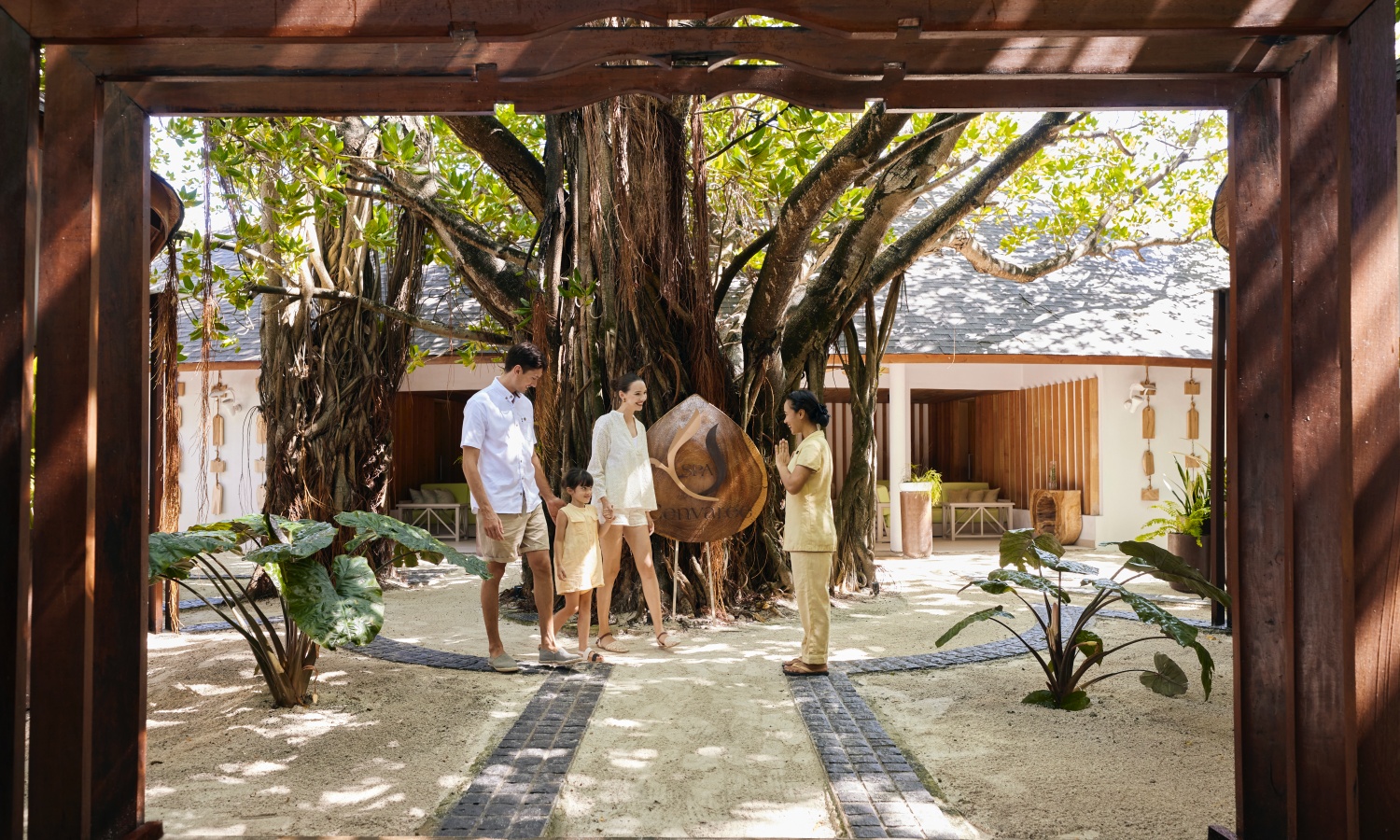
Machchafushi Island Resort & Spa, part of The Centara Collection, offers an island experience shaped by the rhythm of the ocean in the heart of South Ari Atoll. While the resort is widely recognised for its celebrated dive sites, award-winning house reef and rich marine life, another presence quietly anchors the spirit of the island.
Within the peaceful grounds of SPA Cenvaree stands a centuries-old banyan tree known locally as the Ummeedhu Tree, meaning Wish Fulfilment. With its expansive canopy and cascading aerial roots, the tree is regarded as more than a natural landmark. It is a symbol of continuity and reflection, standing as a silent witness to the island’s past and present.
Long before the island became a resort destination, the banyan tree stood rooted in the sands of Machchafushi. Today, the resort honours it as the spiritual heart of the island, inviting guests to pause beneath its branches and engage in moments of reflection and reconnection.
This connection is expressed through the Sacred Thread Ceremony, a contemplative ritual designed to offer guests a personal and meaningful experience. The ceremony begins with a quiet walk through the spa gardens, encouraging stillness and intention. Guests select a delicate golden leaf to represent a personal wish—whether for love, wellbeing, success, abundance or inner peace—and hold it alongside a wish card while visualising that intention fulfilled. The golden leaf is then tied to the banyan’s ancient branches, symbolising the offering of the wish to the tree’s enduring presence. The leaf remains there, carrying the quiet energy of the intention until the guest’s return.
Beyond the banyan, the island continues its natural rhythm. The surrounding waters form part of one of the Maldives’ most significant marine environments, known for year-round whale shark encounters and an extensive house reef that stretches beyond the shoreline. Yet amid the movement of the sea and the vibrancy of coral life, it is often the stillness beneath the banyan tree that leaves the most lasting impression.
Sustainability and heritage are integral to life on Machchafushi Island. Located within the South Ari Marine Protected Area, the island is committed to safeguarding both its marine ecosystems and its cultural identity. The banyan tree stands as a reminder that preservation extends beyond the natural environment to include traditions, stories and the deeper connections between people and place.
At Machchafushi Island Resort & Spa, each day unfolds with moments shaped by nature and intention. From golden sunrises over the lagoon to wishes entrusted to ancient branches, experiences on the island are designed not only to be remembered, but to take root.
Featured
City Iftar experience curated at JEN Maldives by Shangri-La

JEN Maldives by Shangri-La is welcoming the holy month of Ramadan with a series of Iftar evenings at Lime Restaurant, inviting guests to gather in the spirit of reflection, gratitude and togetherness.
Recognising Ramadan as a time that brings families, friends and communities closer, the hotel has curated an Iftar experience designed to go beyond dining. The focus is on creating a welcoming environment where traditions are observed, conversations unfold naturally and shared moments are celebrated around the table.
Located in the heart of Malé, Lime Restaurant provides a warm and contemporary setting suited to a range of gatherings, from colleagues reconnecting after work to families and friends breaking fast together. Each evening reflects the generosity associated with Ramadan, featuring carefully prepared dishes, live cooking stations and a selection of sweet treats that balance traditional flavours with creative touches.
Iftar at JEN Maldives by Shangri-La is shaped by attentive service and thoughtful hospitality. Guests are welcomed into an atmosphere that blends comfort with understated elegance, allowing space for reflection while enjoying a relaxed dining experience. The hotel’s culinary and service teams work closely to ensure consistency, quality and authenticity throughout the season.
Whether for intimate gatherings or larger group celebrations, the venue offers flexibility supported by a culinary programme rooted in care and attention to detail. The Ramadan offering is designed to ensure guests feel at ease while enjoying a distinctive Iftar experience in the capital.
Throughout the holy month, JEN Maldives by Shangri-La invites guests to come together at Lime Restaurant to experience evenings defined by flavour, generosity and meaningful connection, in keeping with the true spirit of Ramadan.
-
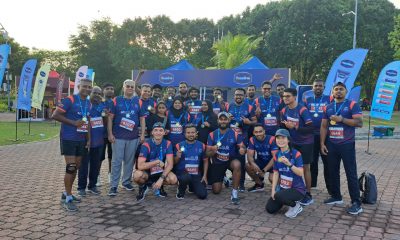
 Action1 week ago
Action1 week agoBestbuy Maldives supports health, wellness as Main Sponsor of MNU Marathon 2026
-

 Cooking1 week ago
Cooking1 week agoMaagiri Hotel invites guests to celebrate Ramadan with daily Iftar
-

 Awards1 week ago
Awards1 week agoEllaidhoo Maldives secures HolidayCheck Gold Award for second consecutive year
-
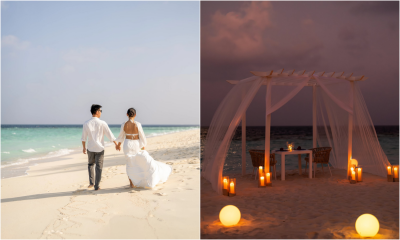
 Love1 week ago
Love1 week agoRomance in nature: Valentine’s week at Eri Maldives
-
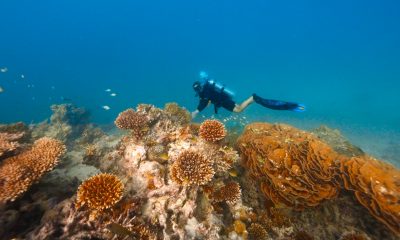
 News6 days ago
News6 days agoVentive Hospitality aligns Maldives portfolio with Green Fins marine sustainability platform
-
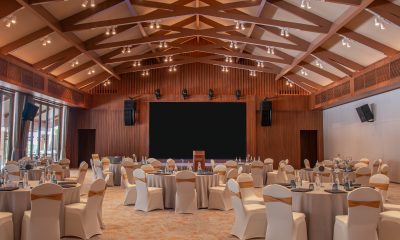
 Business6 days ago
Business6 days agoFeydhoo Hall opens at dusitD2 Feydhoo Maldives as new event space
-
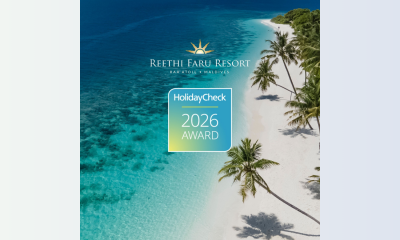
 Awards1 week ago
Awards1 week agoReethi Faru Resort recognised with HolidayCheck Award 2026
-
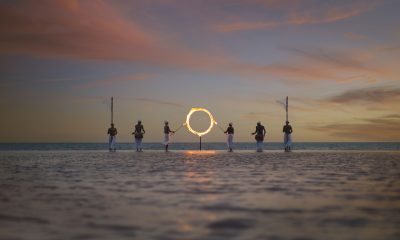
 Awards1 week ago
Awards1 week agoThe Ritz-Carlton Maldives, Fari Islands secures Forbes Five-Star rating for fourth consecutive year



